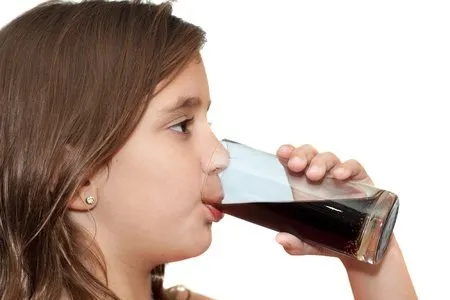Fizzy drinks make fuzzy teeth! Keeping teeth healthy for a lifetime means preventing tooth decay and erosion. Though fluoride in community drinking water dramatically reduces the amount of decay in all age groups, tooth erosion is a newer phenomenon and one that is preventable.
What is erosion?
Erosion is the chemical loss of enamel due to acid. Acid is found primarily in soft drinks, sports drinks, juices and acidic foods. Acid reflux, vomiting and other illnesses that produce stomach acid in the mouth can also erode tooth enamel.
How do fizzy drinks make fuzzy teeth?
When acid continuously attacks teeth, they cannot repair themselves and will gradually begin to turn fuzzy and dissolve. Dentists consider every sip of a low pH drink an acid attack. Even one bottle of soda or a single sports drink, if sipped over hours, can do extensive, irreversible damage to tooth enamel. If high acidity drinks are consumed, it is not simply a matter of having a child clean their teeth an hour or 30 minutes later and hoping they’ll be okay – the damage is already done. Normally, there’s a balance between acids and protective mechanisms in a healthy mouth. But, once that balance is shifted in favor of the acids, regardless of the type of acid, teeth become damaged.
Often, children and adolescents grind their teeth at night, and they can have undiagnosed reflux, which brings with it acidity from the stomach. Combined with drinks high in acidity, this creates a triple threat to young people’s teeth which can cause long-term damage.
What can I do to prevent fuzzy teeth?
STOP the continuous acid and sugar attack on your teeth by limiting the quantity of soft drinks and sports drinks and instead choosing healthy drinks such as milk and water. Reduce the size of the drink and use a straw to draw the damaging liquid away from your teeth. Food consumed with acidic drinks can often help counteract acid attacks. Most important is to brush your teeth with fluoridated toothpaste before bed to reduce bacteria and to help harden your enamel. Wait at least one hour after drinking an acidic drink to brush your teeth to allow your saliva to begin the repair process. Drinking and swishing with water can also help.
Those with orthodontic appliances need to brush as soon as possible to remove food particles and plaque. They are at the greatest risk of decalcification and should limit soft drinks and sports drinks.

